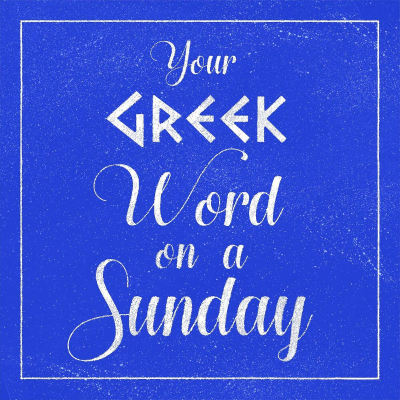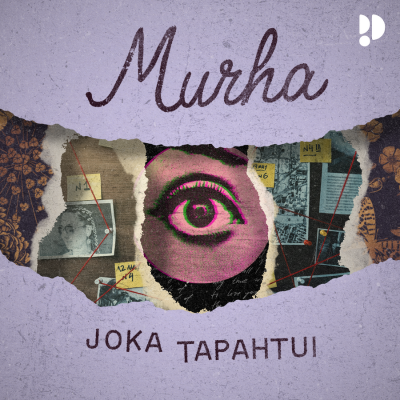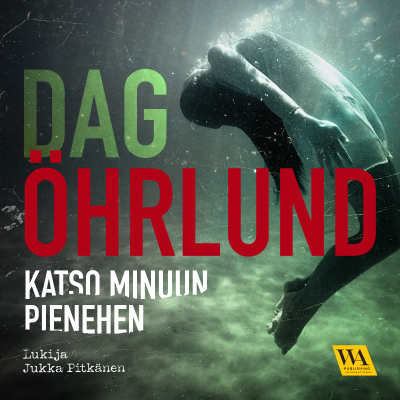
Your Greek Word On A Sunday
Podcast by Emmanuela Lia
Rajoitettu tarjous
3 kuukautta hintaan 1 €
Sitten 7,99 € / kuukausiPeru milloin tahansa.

Enemmän kuin miljoona kuuntelijaa
Tulet rakastamaan Podimoa, etkä ole ainoa
Arvioitu 4.7 App Storessa
Lisää Your Greek Word On A Sunday
Award nominated, bite-size podcast. Every Sunday, Greek words used in the English language. Travelling words, connecting cultures.
Kaikki jaksot
307 jaksotHello and welcome to the last episode for this season. Thank you for staying with me for another year, downloading and sharing the podcast! Our audience is getting bigger and this is all thanks to you! Stay tuned this summer as you might find a bonus episode or two coming your way during our break and if you haven’t yet leave a review on the platform of your choice. It does help other people find us and I always love reading what you have to say. If you're on this side of the globe have a fantastic summer and if you're on the other one, have a great autumn Hello, and welcome to Your Greek Word On A Sunday, a weekly, bite-size podcast for anyone curious on language, etymology and connections. I am your host, Emmanuela Lia and wherever you are in the world, if you want to entertain your brain for a few minutes, this is the podcast for you. Let's Go! Today’s episode is thanks to our listener Dale Choate , American expat in London, creative director extraordinaire and of course Gregophile . Thanks Dale. Πειρείν is the Ancient Greek infinitive of ‘I try/I attempt ‘ and Πειρατής (Peiratis) is the one attempting . it’s directly linked to an attack and in particular at sea. The practice goes a long way back and has been documented as an acceptable one in the Mediterranean sea, between countries. it was perfectly legal to attack and steal goods and ships from another nation. It was illegal to attack your own. Until the Romans made it illegal all around (and I suspect it was because they didn’t have great nautical skills) The stories of tactics, thief leaders and, trade offs in the ancient world are fascinating and in the Mediterranean in particular because of the proximity of countries, seafaring and, trade. Although the word originated in Greece -not because that’s where it began but because the meaning was so accurate- it has been used in many languages. Piraat in Dutch, Pirat in German, Pirata in Spanish, Italian and Latin and Pirat in French where it arrived from in English, in the 14th century. ΠΕΙΡΑΤΗΣ/PIRATE Instagram @yourgreeksunday , Blue Sky @yourgreeksunday.bsky.social email yourgreeksunday@gmail.com
Hello, and welcome to Your Greek Word On A Sunday, a weekly, bite-size podcast for anyone curious on language, etymology and connections. I am your host, Emmanuela Lia and wherever you are in the world, if you want to entertain your brain for a few minutes, this is the podcast for you. Let's Go! Στάδιο (stadio) in Ancient Greece was the most popular game in the Olympics and the very first one. From 776 to 724BC that 200 yard race, was the Olympics! But it remained as the most important one even when other games where added and the winner’s name would be given to the entire event for the next 4 years .The runners would compete naked and they were supervisors both in the beginning and the end of the race to make sure everything was done properly. If there was a tie the race would be repeated until a clear winner was declared. The name of the game became both a measurement for distance and the name of the place the race was happening. The measurement arrived in English with the first Bibles around 1300 and was translated as 'furlong' and in 1834 ‘a large open oval structure with tiers of seats for viewing sporting events’ was a ΣΤΑΔΙΟ/STADIUM Audible [https://www.audibletrial.com/xL2kby] Step into another world! Listen to any audiobook with a month long free trial (cancel anytime) Disclaimer: This post contains affiliate links. If you make a purchase, I may receive a commission at no extra cost to you. Instagram @yourgreeksunday , Blue Sky @yourgreeksunday.bsky.social email yourgreeksunday@gmail.com
Hello, and welcome to Your Greek Word On A Sunday, a weekly, bite-size podcast for anyone curious on language, etymology and connections. I am your host, Emmanuela Lia and wherever you are in the world, if you want to entertain your brain for a few minutes, this is the podcast for you. Let's Go! When Homer described the colour of the sea as 'wine-dark' in both the Odyssey and the Iliad, I'm sure he didn't anticipate the avalanche of misconceptions that would follow what-probably- was a moment of lyrical inspiration for the Greek Bard. And if you're wondering how can such a description cause linguistic mayhem , I urge you to ask the world wide web the following question: Did ancient Greeks have a word for the colour blue? And further more: were the ancient Greeks able to see the colour blue? Because no misconception is complete unless it's followed by a conspiracy theory nowadays. To save you the trouble the answers are 'yes' and 'yes' .What they didn't have, was the same vocabulary or colour palette as us. What we call today a shade of a colour to the ancient Greeks was the colour itself. So, as a modern example, burgundy would not be a shade of red but a colour of its own. Blue was not in the picture because there was turquoise, like the stone and the word for the lighter shade , that arrived in English through Latin and French in 1879, was first used by innovator, photographer and printer Edward Steichen, to describe a colour in his print of the solar spectrum. The Greeks used it in several combined words to define the exact shade but the colour of the sky, on a great, Greek, sunny day was ΚΥΑΝΟ/CYAN Audible [https://www.audibletrial.com/xL2kby] Step into another world! Listen to any audiobook with a month long free trial (cancel anytime) Disclaimer: This post contains affiliate links. If you make a purchase, I may receive a commission at no extra cost to you. Instagram @yourgreeksunday , Blue Sky @yourgreeksunday.bsky.social email yourgreeksunday@gmail.com
Hello and happy July everyone! The results of the prize draw are in and our winner is...Melanie Bittner from Germany! Congratulations Melanie, you will be receiving your gift very soon! Thank you for submitting your favourite episode which is from 2022 (now that's a loyal listener!). Let's pretend for a moment we're an old fashion radio station-I'm gonna lower my voice-and this, is a request from Melanie. Here, is her favourite episode Hello, and welcome to Your Greek Word On A Sunday, a weekly, bite-size podcast for anyone curious on language, etymology and connections. I am your host, Emmanuela Lia and wherever you are in the world, if you want to entertain your brain for a few minutes, this is the podcast for you. Let's Go! Συριγξ (Syrinx) in Ancient Greek was the name of an Arcadian Nymph. When the god Pan was young, he fell in love with her and chased her to the shores of the river Λάδων (Ladon). She clearly wasn't interested because she hid among the canes by the shore. Pan never found her but he made his musical instrument, known as pan-pipe from those canes and he named it, in Greek, after her. Later on, anything with the shape of a hollow cylinder would be named after her. From long tunnels to injection instruments, her name would reach medieval Latin as Syrinx , before landing in England. Συριγξ/Syringe Audible [https://www.audibletrial.com/xL2kby] Step into another world! Listen to any audiobook with a month long free trial (cancel anytime) Disclaimer: This post contains affiliate links. If you make a purchase, I may receive a commission at no extra cost to you. Instagram @yourgreeksunday , Blue Sky @yourgreeksunday.bsky.social email yourgreeksunday@gmail.com
Hello, and welcome to Your Greek Word On A Sunday, a weekly, bite-size podcast for anyone curious on language, etymology and connections. I am your host, Emmanuela Lia and wherever you are in the world, if you want to entertain your brain for a few minutes, this is the podcast for you. Let's Go! This is a word that has changed very little and has a very interesting story. Στίζειν (stizin) is an ancient Greek infinitive meaning 'to mark'. The verb is Στιγματίζω (stigmatizo). Although in many countries being tattooed is considered an honourable action, the Ancient Greeks used it as a mark of disgrace. And they learned that from the Persians. In one of the battles between Greece and Persia, some Greeks joined the other side. When that battle was lost and Greeks surrendered, the Persians thought the traitors might double cross them in the future so, they marked their foreheads with the Persian royal emblem. We have several mentions from the historian Herodotus of Athenians, marking their enemies' foreheads with the Athenian symbol, the owl. Greeks also used a very painful method way to remove tattoos. It took 20 days and involved a cloth to tie around the head, a needle to pierce the tattoo, salt to dry it and either, gypsum and sodium carbonate or pepper dust and honey. Tattoos seemed to be almost exclusively on foreheads and marked criminals and slaves too. The word came to English in the late 1500s in the writings of courtier and author Sir John Harington and he used the Latinised spelling of the Ancient Greek noun ΣΤΙΓΜΑ/STIGMA Audible [https://www.audibletrial.com/xL2kby] Step into another world! Listen to any audiobook with a month long free trial (cancel anytime) Disclaimer: This post contains affiliate links. If you make a purchase, I may receive a commission at no extra cost to you. Instagram @yourgreeksunday , Blue Sky @yourgreeksunday.bsky.social email yourgreeksunday@gmail.com

Arvioitu 4.7 App Storessa
Rajoitettu tarjous
3 kuukautta hintaan 1 €
Sitten 7,99 € / kuukausiPeru milloin tahansa.
Podimon podcastit
Mainoksista vapaa
Maksuttomat podcastit

































